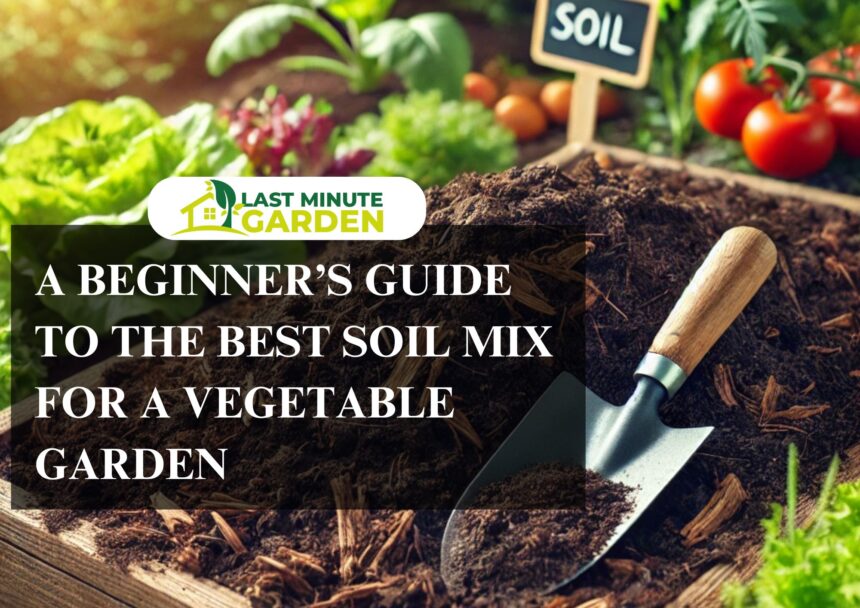Creating the best soil mix for a vegetable garden starts with one fundamental element—good soil. Without the right soil mix, even the healthiest seeds and plants may struggle to grow.
For beginners, understanding how to prepare and maintain nutrient-rich soil can make all the difference in achieving a productive vegetable garden.
In this guide, we’ll explore the best soil mix for a vegetable garden, its essential ingredients, and how to create a DIY blend that ensures optimal plant growth.
Why Soil Quality Matters in Vegetable Gardening
Soil is more than just dirt—it provides the necessary nutrients, drainage, and aeration that vegetable plants need to thrive.
A well-balanced soil mix improves plant health, increases yield, and helps prevent common issues like root rot, nutrient deficiencies, and poor water retention.
Without a good soil structure, your plants may suffer from compacted soil, which prevents root growth and water absorption.
Nutrient depletion is another common issue, leading to weak or stunted plants that fail to produce a good harvest.
Additionally, poor drainage can cause waterlogging and root diseases, negatively affecting plant growth.
By using the best soil mix for a vegetable garden, you create the perfect environment for strong, healthy plants that can withstand various environmental conditions.
Essential Ingredients for the Best Vegetable Garden Soil Mix
A high-quality soil mix contains the right balance of nutrients, organic matter, and minerals. Here are the key components that should be included:
1. Topsoil
Topsoil is the base of any garden soil mix. It provides the main growing medium for vegetables, containing natural minerals and some organic matter.
Choose high-quality, loamy topsoil that is rich in nutrients and has good drainage properties.
2. Compost
Compost is a powerhouse ingredient that enriches the soil with organic matter and beneficial microbes.
It improves soil texture, enhances water retention, and provides essential nutrients like nitrogen, phosphorus, and potassium.
Use homemade compost from kitchen scraps, grass clippings, and leaves, or purchase organic compost from a local garden center. this combination would help create the best soil mix for a vegetable garden.
3. Coconut Coir or Peat Moss
Both coconut coir and peat moss help retain moisture while improving soil aeration. Coconut coir is a more sustainable alternative to peat moss and works well for balancing water retention and drainage.
4. Perlite or Vermiculite
These materials help improve drainage and aeration in the soil. Perlite is a lightweight volcanic rock that prevents soil compaction, while vermiculite helps retain moisture and nutrients.
Choose the one that best suits your climate and watering habits.
5. Aged Manure
Aged manure from cows, horses, or chickens is a fantastic organic fertilizer that enriches soil with nitrogen and other nutrients
Ensure the manure is well-composted before use to avoid burning plants with excessive nitrogen.
6. Worm Castings
Worm castings are rich in beneficial microbes and essential nutrients, enhancing soil fertility.
They also improve root development and plant immunity. Adding just a small amount of worm castings to your soil mix can significantly boost plant health.
7. Organic Fertilizers
Adding organic fertilizers like bone meal, blood meal, or fish emulsion can provide an extra nutrient boost. These fertilizers help sustain plant growth and improve vegetable yield.
DIY Soil Mix for a Thriving Vegetable Garden
If you want to create the best soil mix for a vegetable garden at home, follow this simple DIY recipe:
Basic Vegetable Garden Soil Mix Recipe
- 40% High-quality topsoil (provides minerals and structure)
- 30% Organic compost (improves fertility and microbial life)
- 20% Coconut coir or peat moss (enhances moisture retention)
- 5% Perlite or vermiculite (boosts drainage and aeration)
- 5% Aged manure or worm castings (adds essential nutrients)
Before using your soil mix, test its moisture retention by squeezing a handful in your palm. The mixture should hold together slightly but crumble when pressed.
If it feels too dry, add more compost or coconut coir. If it retains too much moisture, incorporate additional perlite to improve drainage.
This homemade soil mix provides the perfect balance of nutrients, moisture retention, and aeration, ensuring that your vegetable garden thrives.
Additional Soil Tips for Beginner Gardeners
1. Test Your Soil Regularly
A soil test kit can help determine your garden soil’s pH level and nutrient content. Most vegetables thrive in soil with a pH between 6.0 and 7.0. Adjust the pH using lime (to raise pH) or sulfur (to lower pH) if necessary.
2. Rotate Crops to Maintain Soil Health
Growing the same vegetables in the same spot each season can deplete nutrients and attract pests. Crop rotation helps preserve soil fertility and reduces the risk of soil-borne diseases.
3. Use Mulch to Conserve Moisture
Applying mulch (such as straw, grass clippings, or wood chips) helps retain soil moisture, suppress weeds, and regulate temperature. It also enriches the soil as it decomposes.
4. Avoid Using Chemical Fertilizers and Pesticides
Synthetic fertilizers and pesticides may offer quick results but can degrade soil health over time. Instead, opt for organic pest control methods and natural fertilizers to keep your vegetable garden healthy.
5. Improve Soil Over Time
Soil quality improves the more you add organic matter and maintain proper drainage. Regularly amending your soil with compost and natural fertilizers ensures a continuous supply of nutrients for your plants. Creating the best soil mix for a vegetable garden ensures that plans are well nourished and thrive all year round.
Conclusion
For beginners, experimenting with different soil amendments and observing plant growth will help fine-tune your soil mix over time.
Choosing the best soil mix for a vegetable garden is the foundation of a successful and productive growing space.
Whether you’re growing tomatoes, peppers, lettuce, or root vegetables, a well-prepared soil mix ensures a bountiful and chemical-free harvest.
Start preparing your ideal soil mix today and watch your vegetable garden flourish naturally!





